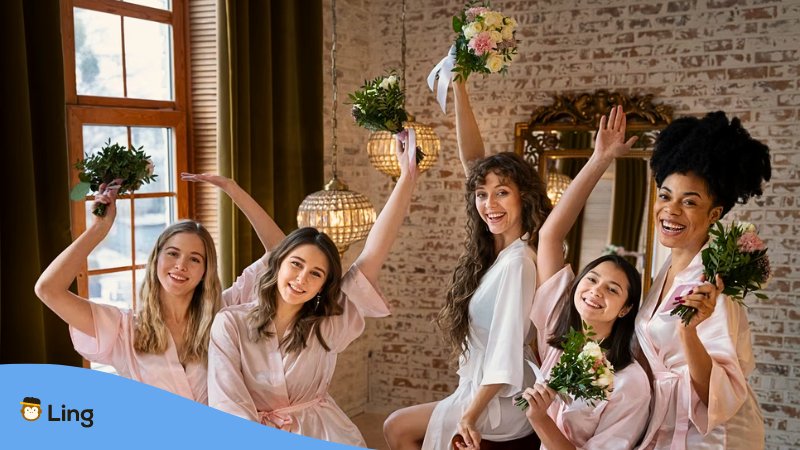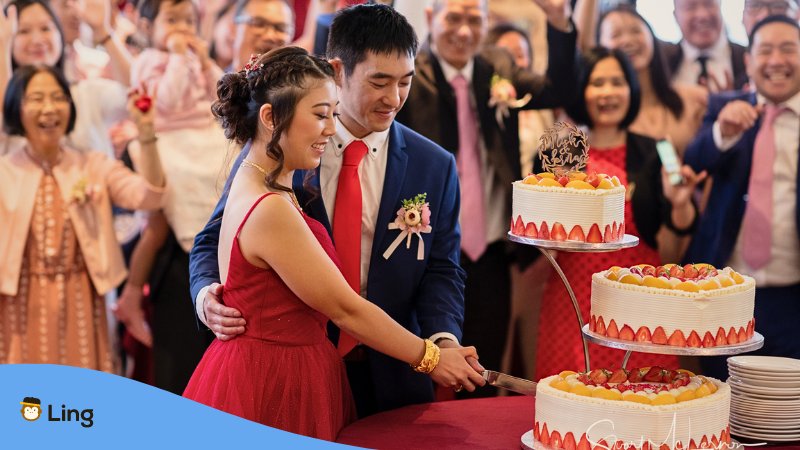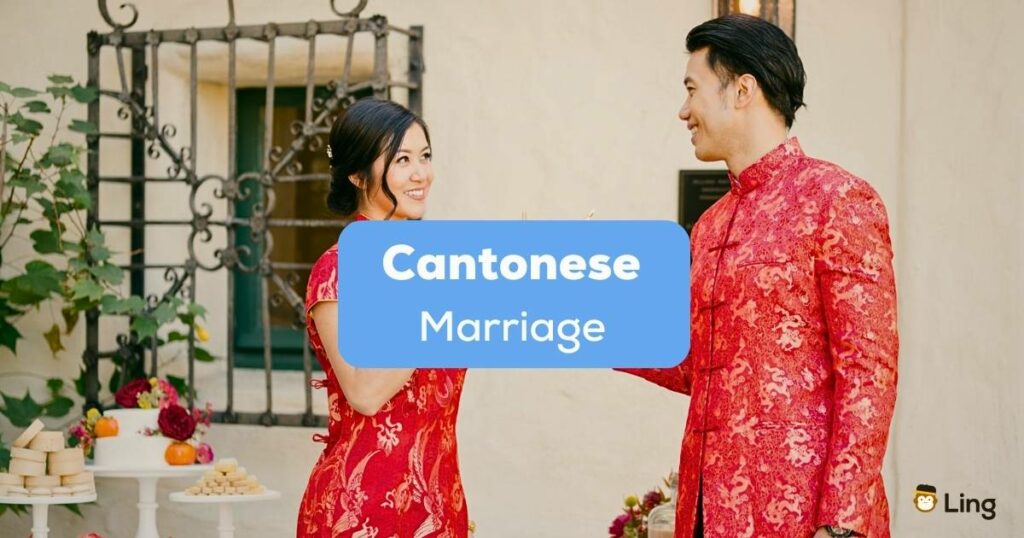You’re on a journey to master Cantonese, and guess what? There’s a whole chapter on marriage vocabulary that you shouldn’t skip. Why? Because these aren’t just words. They’re keys to understanding deep-rooted traditions and rituals. Today, we’ll unpack terms beyond the usual “bride” and “groom.” Have you ever heard of the “Hair Combing Ceremony” or wondered why the “auspicious date” is such a big deal? Stick around, and you’ll learn these terms and grasp their cultural weight. Ready to enrich your Cantonese vocabulary in a way you never thought of? Let’s dive in.
Why Cantonese Marriage Vocabulary Matters
When you learn Cantonese marriage vocabulary, you’re not just memorizing words. You’re unlocking a whole world of Chinese wedding traditions that have been around for ages. Here’s why:
- Cultural Insight: You’re not just sitting clueless at a Cantonese wedding when you know the lingo. You understand what’s happening and why.
- Social Navigation: Ever been the odd one out at a Cantonese wedding? Knowing these terms is your ticket to fitting in. You can chat, laugh, and understand what you’re talking about.
- Language Depth: These are the kinds of words that make native speakers do a double-take. They show you’ve gone beyond “hello” and “thank you,” diving deep into the language.

Key Terms You Should Know
So, you’ve got the gist of why this vocabulary is a big deal. Now, let’s discuss the terms you’ll hear repeatedly at any Cantonese marriage. Knowing these will make you feel like you’re in the know, not just making small talk.
Words For The Main Players
First, let’s talk about the stars of the show: the bride, the groom, and their families. These are the people around whom the whole event revolves. You’ll hear their titles announced, whispered, and maybe even sung.
- Bride (新娘, San1 Neung4) – She’s the show’s star, and you’ll hear this term often, especially during the Chinese tea ceremony.
- Groom (新郎, San1 Long4) – The other half of the wedding duo. His role is prominent in rituals like “fetching the bride.”
- Bride’s Family (新娘家庭, San1 Neung4 Gaa1 Ting4) – They usually host the wedding and are deeply involved in preparations like the dowry.
- Groom’s Family (新郎家庭, San1 Long4 Gaa1 Ting4) – Often responsible for the wedding banquet and for welcoming the bride into their home.
The Wedding Event Itself
Now that you know who’s who, let’s talk about the main event. These terms are the building blocks of the wedding day. You’ll hear them in speeches, see them on invitations, and they’ll be the buzzwords of the day.
- Wedding Ceremony (婚禮, Fan1 Lai5) – The main event where vows are exchanged.
- Wedding Banquet (喜宴, Hei2 Jin6) – A grand feast that usually follows the ceremony.
- Wedding Date (婚期, Fan1 Kei4) – Carefully selected, often based on the lunar calendar for good luck.
- Wedding Day (婚禮日, Fan1 Lai5 Jat6) – The day when all the rituals and celebrations happen.
Rituals And Traditions
Last but not least, the rituals and traditions. These are the moments that make a Cantonese marriage unique. They’re steeped in symbolism and packed with meaning.
- Tea Ceremony (茶禮, Caa4 Lai5) – A ritual where the newlyweds serve tea to their elders as a sign of respect.
- Hair Combing Ceremony (梳頭儀式, So1 Tau4 Ji4 Sik1) – A pre-wedding ritual symbolizing the bride and groom’s transition into adulthood.
- Auspicious Date (吉日, Gat1 Jat6) – A date chosen for its promise of good fortune and a harmonious marriage.

Must-Know Phrases
So, you’ve got the words down. But what about the phrases that bring these terms to life? You know, the ones that you’ll actually hear people saying at a Cantonese wedding. These phrases are the soundtrack to all the rituals and celebrations.
Proposal To Wedding Day
From the moment someone pops the question to the big day itself, you’ll want to have a whole set of phrases in your back pocket.
- Will You Marry Me? (你願意嫁給我嗎?, Nei5 Jyun6 Ji3 Gaa1 Kap1 Ngo5 Maa3?) – The phrase that kicks off the wedding journey.
- We’re Engaged! (我哋已經訂婚啦!, Ngo5 Dei6 Ji5 Ging1 Ding6 Fan1 Laa1!) – This is the happy announcement usually made by the couple.
- Save the Date (記得嚟我哋嘅婚禮, Gei3 Dak1 Lei4 Ngo5 Dei6 Ge3 Fan1 Lai5) – An invitation phrase often used to remind guests of the wedding day.
During The Ceremony
Now, let’s focus on the ceremony itself. You’ll hear some of the most traditional and meaningful phrases here.
- We Are Gathered Here Today (我哋今日係嚟舉行婚禮, Ngo5 Dei6 Gam1 Jat6 Hai6 Lei4 Geoi2 Hang4 Fan1 Lai5) – Often said by the officiant to start the ceremony.
- I Do (我願意, Ngo5 Jyun6 Ji3) – The phrase that seals the vows, leading to the first kiss.
- You May Kiss the Bride (你可以親吻新娘, Nei5 Ho2 Ji5 Can1 Man5 San1 Neung4) – The iconic phrase signaling the first kiss as a married couple.
At The Wedding Banquet
Lastly, the wedding banquet is a feast of Cantonese food and phrases. Here’s what you’ll likely hear as you’re enjoying the festivities.
- Cheers (乾杯, Gon1 Bui1) – A common toast you’ll hear throughout the banquet.
- Wishing You a Happy Marriage (祝你哋百年好合, Zuk1 Nei5 Dei6 Baak3 Nin4 Hou2 Hap6) – A popular blessing given to the newlyweds.
Dos And Don’ts At A Cantonese Marriage
Alright, you’re almost ready to rock a Cantonese wedding. But hold on, knowing the words and phrases is half the battle. The other half? Knowing what to do and what not to do.
Things You Should Do
- Dress Appropriately: Red is the go-to color, symbolizing good luck and joy.
- Bring a Red Envelope: Giving a red envelope filled with money is customary as a gift.
- Participate in the Tea Ceremony: If you’re a close family member, be prepared to be served tea and to give a red envelope in return.
Things You Shouldn’t Do
- Wear White or Black: These colors are traditionally associated with funerals, not Chinese weddings.
- Decline Invitations to Participate: Whether it’s a game or a ritual, participation is key.
- Speak Inauspicious Words: Avoid mentioning anything related to death or bad luck.
Learn Cantonese With The Ling App!
Now, you’re all set to be a hit at the next Cantonese marriage you attend. But why stop there? With the Ling app, you can take your Cantonese skills to the next level and beyond.
We offer many languages—over 60, and our content is as fresh as it gets. We’re talking interactive games, fun activities, and all the good stuff that makes learning feel less like a chore and more like a game.
Ready to keep the language-learning ball rolling? Download the Ling app now on Google Play and App Store. Trust me, it’s the decision you’ll high-five yourself for later.


































































